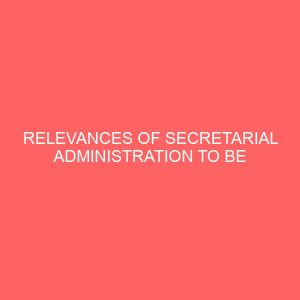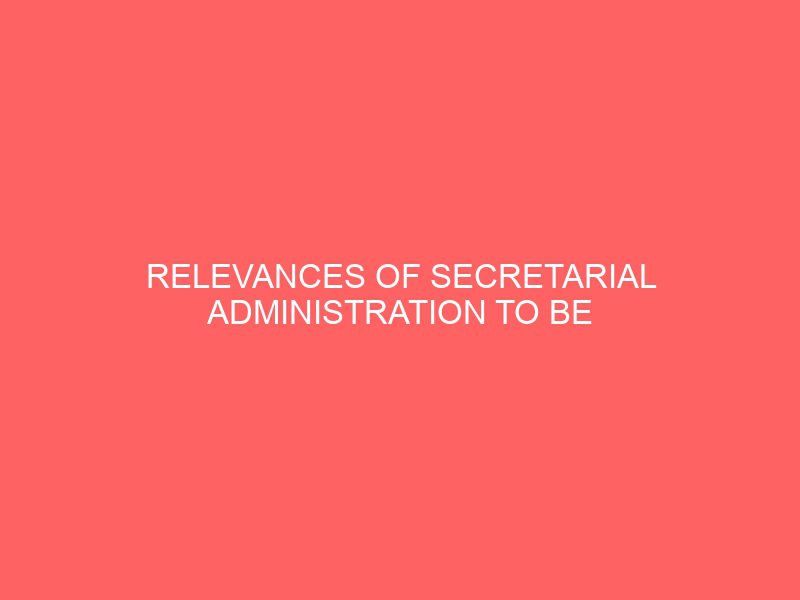Description
CHAPTER ONE
1.0 INTRODUCTION
Historically, it has been said that secretarial profession is as old as age itself. The progress of life has record many men and women who have registered their footprints on the sand of time. Their development has brought about secretaries who recorded their deeds.
The word secretary is derived from the Latin word called ?Secretive?, meaning ?keeping of secrets?. The earliest records of ancient civilization indicate that scribes were used by the Assyrians as long as the 18th Century BC by the 2nd Century BC, scribes had reached professional status and were employed in the libraries of Century AD Scribe were used to assist with the business affairs and personal correspondence of those who could not read and write. Most affairs of government also required the services of the scribes, and then called ?Secretary?.
Towards the end of the 19th Century, with the invention of the typewriter and the Gregg Proficiency, Secretarial work began to take over duties formally performed were then called, were trailblazers in business offices. They were eager to trade a life on the farm or in factory for a very different life in a business office. Although their manner was quite, their roles subservient, their dress, conservative, their salary merger, the historical impact of these women was revolutionary. They were instrumental in changing the whole character of the business office. Today there are several millions secretaries in the United States. Though the majorities are women many men are now choosing this as their profession Secretaries titles range from junior stenographer to Administration Assistant. Their work range from taking Shorthand and transcribing verbatim, notes on the typewriter, to handling all administrative duties of a large modern business organization. Secretaries may work in different kinds of place from small Secretary Office to large communication centers in major cities.
They may work for many executive or for only one, but their function is basically the same-keeping business smoothly through the application of their Secretaries skills and abilities. The status of today?s Secretary Ranks considerably higher than the status of a Secretary is 50years age. The Secretary is really an executive aide, who skill does the traditional jobs of taking dictation, typing, filling and handling calls and callers. But in many ways, today?s Secretary must the job of the boss better than boss. It has been said that behind a very good executive there is a good secretary. Today, there is a tremendous demand for good secretaries, and authoritative sources indicate that this demand will continue to grow.
1.1 BACKGORUND TO THE STUDY
Secretarial practice of all secretarial duties including administration and supervisory functions. The ultimate secretarial functions in the office are preparation and mailing of errorless correspondence, the maintenance and supervision of an error-free desk diary the presentation to the executive in concise from as a neat package of everything that the boss may need for each interview report or other items of work in the boss?s daily routine of agenda, their distribution to those concerned the seating in the meeting room, the minting of the meeting itself and the following up of decisions attend to. The Secretary will be also be expected to organize conferences arrange the said invitation cards to guests, and book accommodation, arrange executive travel and perform countless other secretarial activities.
Geoffrey White head stated that ?secretarial? practice is a term used to describe the procedures and method of work adopted by private secretaries, it is similar to but at a higher level than office practice. A person performing clerical duties needs to have an understanding of office practice. Office practice contains routine office activities that form the Basic of the Secretary?s procedures. Executive Secretarial practice extends the study of office practice into higher level of Secretarial works, where the secretary who is already familiar with the more routine techniques faces further problem. In spite of the manner in which this assertion has been made, it is certainly not an exaggeration of the main functions of the Secretary. Rather, the assertion is a reasonable and fair summary of the true nature of secretarial studies as a profession. As the world progresses, administrative managerial functions become more complex thereby increasing the task of managers and the like, whose functions it is to see to the successful implementation of these ever-increasing functions. The managers are, therefore frequently in need of administrative assistants who can help them to successfully perform their enormous tasks. The purpose of secretaries there is to compliment the effort of the Manager, thereby facilitating the attainment of the Manager?s functional goals in particular and the Achievement of the Organization?s objectives in general.
1.2 OBJECTIVES OF THE STUDY
Stated specifically, the study aims at,
(a) Ascertaining the popularity and acceptability of the secretary to the employer
(b) Finding out that secretary is the productivity standard, the secretary should strive to attain, the renummeration appropriate and career prospects.
(c) Determine how public enlightment could enhance the professional status of the secretary.
(d) Knowing whether educational background affects the efficiency of the secretary.
(e) Finding out the impact of efficiency
(f) Making recommendations on ways of improving the secretary?s professional status.
1.3 STATEMENT OF THE PROBLEM
The changing nature of business environment imposes greats challenged secretaries as well as other experts in the practice of their profession to the change in the technological, social, political and economic to be a potential growth field but the nature and extent of its growth in relation to the profession?s age and economic growth, demands a more directional growth.
Many factors could be advice to be responsible for the poor performance level in the attainment of professional status. Some of such factor include the origin of the profession, the people who initiated it, the fact that most trained secretaries use the profession as a stepping stone in life, the supportive (submerged) nature of the practitioners in an organization?s set-up the ignorance of the general misconception of equality the shorthand typists and secretaries. Also the level of education of the pioneers of the profession.
1.4 RESEARCH QUESTION
In order to achieve the objectives of this study a number of question would be explored consistent with the topic and objectives the following research question will guide the study.
1. Does Secretarial practice relevant to the upliftment of an institution?
2. Does Secretarial practice serve as an instrument towards the upliftment of an institution?
1.5 SIGNIFICANCE OF THE STUDY
I believe that this study will no doubt be of immense importance to the practicing secretary, employers, trainers of secretaries, the reader, the writer and the secretarial profession in general. The intentions of this work and the effort of the researcher is mainly directed to finding the scope of Secretarial Practice that is, who the secretary is, the duties actually performed, the recommendations of this work help in re-orientating his professional practicing effort with a view to addressing his mind to those basic issues.
In so doing, the secretary can improve on his performance, in other words, this study would stimulate efficiency in secretaries practice, and the consequent in professional recognition.
The research hopes to benefit from this study being exposed to secretarial practice in the private sector, and could afford her the potential of being an efficient and successful secretary if she decides to practice on living school. Furthermore, this study is of significance to the researcher in so far as it offers her the opportunity of delving into the office norms and method involved in private secretarial practice. This is no doubt, of immense academic value and practical value to budding top secretaries.
1.6 OPERATIONAL DEFINITION OF TERMS
1. Secretary: – Somebody elected or appointed to keep the records of the meetings of an organization such as club, society, or committee and to write or answer letters on its behalf. An employee who does clerical and administrative work in an office for a person or organization.
2. Practice: – To do something repeatedly in order to improve performance.
3. Secretaries Duties: This means secretary ship as an art discipline that could be studied or learn. Official set-up business enterprise or organization or an institution.
4. Secretarial Functions: These are the duties and responsibilities, which the secretary is professional, required carrying out in the field.
This is divided into two broad groups:
2 Primary Functions: The duty contained here requires the basic secretarial skills and abilities, and constitutes the sole responsibilities of shorthand-typists and stenographers. They constitute the major functions similar to secretaries and shorthand-typists and stenographers.
3 Secondary Function: Administrative secretarial duties and responsibilities which require business knowledge and sound educational background to enable the secretary perform well. They distinguish the secretary from shorthand-typists and stenographers, they are also known as Executive Secretarial Duties.
5. Secretarial practice: – The term ?secretarial practice? has been used to include knowledge, skills, procedure and methods of work to be performed by a Private Secretary or Office Assistant.
6. Instrument: – A tool or implement, especially one for precision work.
7. Upliftment: – Is defined as to lift up or raise.
8. Institution: – An organization founded for a religious, educational, professional, or social purpose.
1.7 LIMITATIONS OF THE STUDY
The scope of this is limitation to University of Ibadan. Because of the organizational set-up of the institution and the fact that the company is a member of Iddo Group of Companies, an investigation conducted in it would represent a fair situation of the private sector. The researcher encountered the following.
Limitations:
(i) There was unwillingness and lack of interest on the part of some of the respondents (employees of the company including those shorthand-typists and stenographers), resulted in the loss of some questionnaires.
(ii) Suspicion as to the intents and purpose of the research prevented some of the staff and Chief Executives of the company from giving adequate information, particularly as the company is owned by foreigners.
(iii) Time and finance elements constitute yet other major obstacles, since the duration for the writing of this project work involved attending lectures and having to travel to Lagos to distribute and collect questionnaires, and conduct interviews in the company of study.








